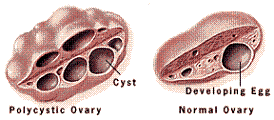|
Infertility and the Havoc of HormonesArticle submission, Thursday 16th October 2008
Highly common dilemma, many of my friends suffer from this problem, especially having witnessed their mute suffering. Unlike obvious physical disability, infertility does not have external manifestations and can be uncovered when you plan to start your family.
And then over a period of inability to bear children often becomes a 'master status' for the affected persons (mostly women), that is, the main prism through which they define themselves and are judged by others. The most common cause of infertility in women today is PCOD or PCOS. Polycystic ovary syndrome (PCOS) is a disorder that occurs due to imbalances or abnormalities in the hormones Hormonal abnormalities can make the ovaries produce more eggs. These eggs turn into Cysts and the ovaries become large and studded with numerous Cysts (polycystic). It may begin in the teenage years and mostly affects women of childbearing age. Symptoms of PCOD, such as weight gain, excess hair growth (particularly on the face), thinning hair, and acne, can be upsetting and affect a woman's confidence. Coping with PCOD can be stressful and women can experience depression and mood swings. Taking care of yourself, reducing stress, and getting support from family and friends is important. It is a condition that causes both physical and psychological damage. This complex hormonal disturbance affects the entire body. Most of the time it leads to obesity and then aggravates PCOD. Typical obesity with PCOD is described as “centripetal,” related to fat distribution in the center of the body, as opposed to the thighs and hips. Certainly, many metabolic problems improve with weight loss; such individuals gain weight very easily and lose it only with great effort. Everyone knows that some individuals consume large quantities of food and never gain weight while others work hard but still look plump For weight control, often, the obese patient has been told to exercise more, or to eat less. Clearly, this over-simplification fails to take into account the high likelihood that individuals vary in many ways than just their body’s ability to utilize calories. A key to the way the body uses energy is insulin. Insulin is a hormone released by the pancreas in response to the breakdown of food into sugars, proteins and fats by the digestive system. In Obese women with PCOD, 35% have impaired glucose tolerance and 10% have diabetes mellitus. Women with polycystic ovary syndrome (PCOS) are insulin resistant, have insulin secretory defects, and are at high risk of glucose intolerance. Diet control to alleviate hyperinsulinemia and weigh control is very crucial for the treatment. They benefit from a low-calorie diet for weight reduction. Start with decreasing the intake of simple carbohydrates and fat in every meal. But increase fibre and complex carbohydrates to feel full with less calories. Go for a GI/GL diet (Glycemic index/load diet). Keep encouraging your self as the loss of weight is not going to be dramatic. But slowly you will surely be at your goal. Encourage moderate physical activity. Important Vitamin and minerals in insulin metabolism are Folic Acid which helps the body to create and maintain DNA and RNA, the building blocks of life. The B-group vitamins help in glucose metabolism too, glucose metabolism it is essential for healthy blood. Low intake of iron is associated with anemia, weaknesses, fatigue and reduced work performance inactivity. Zinc and chromium are necessary as cofactors. Above information is given in good faith however for any diseased condition please consult physician or dietician Your questions and suggestions are welcome at: smartediets@gmail.com. For more information log onto www.livingsmart.in and www.healthyediets.com. Back to Healthy Living 
|




